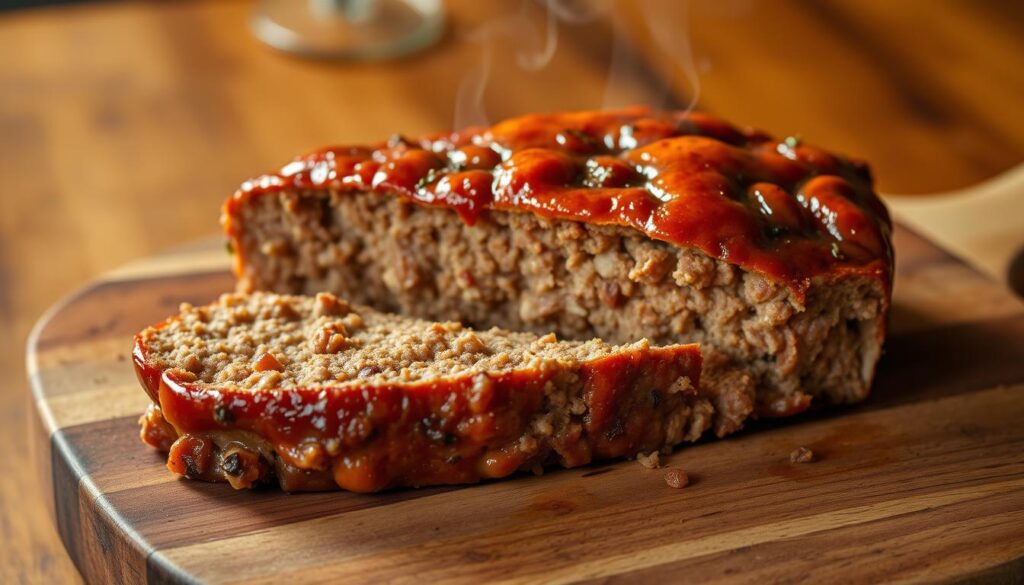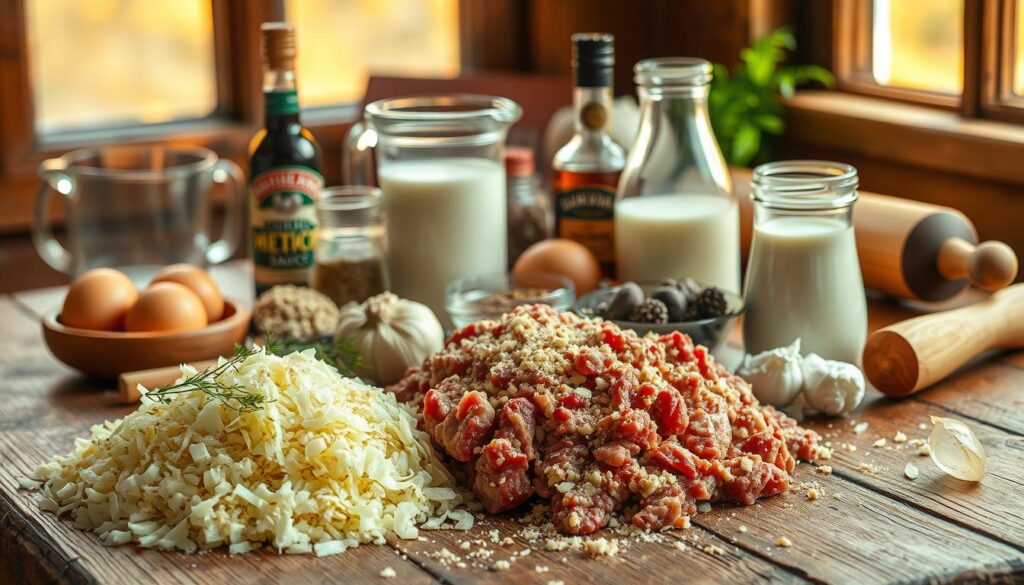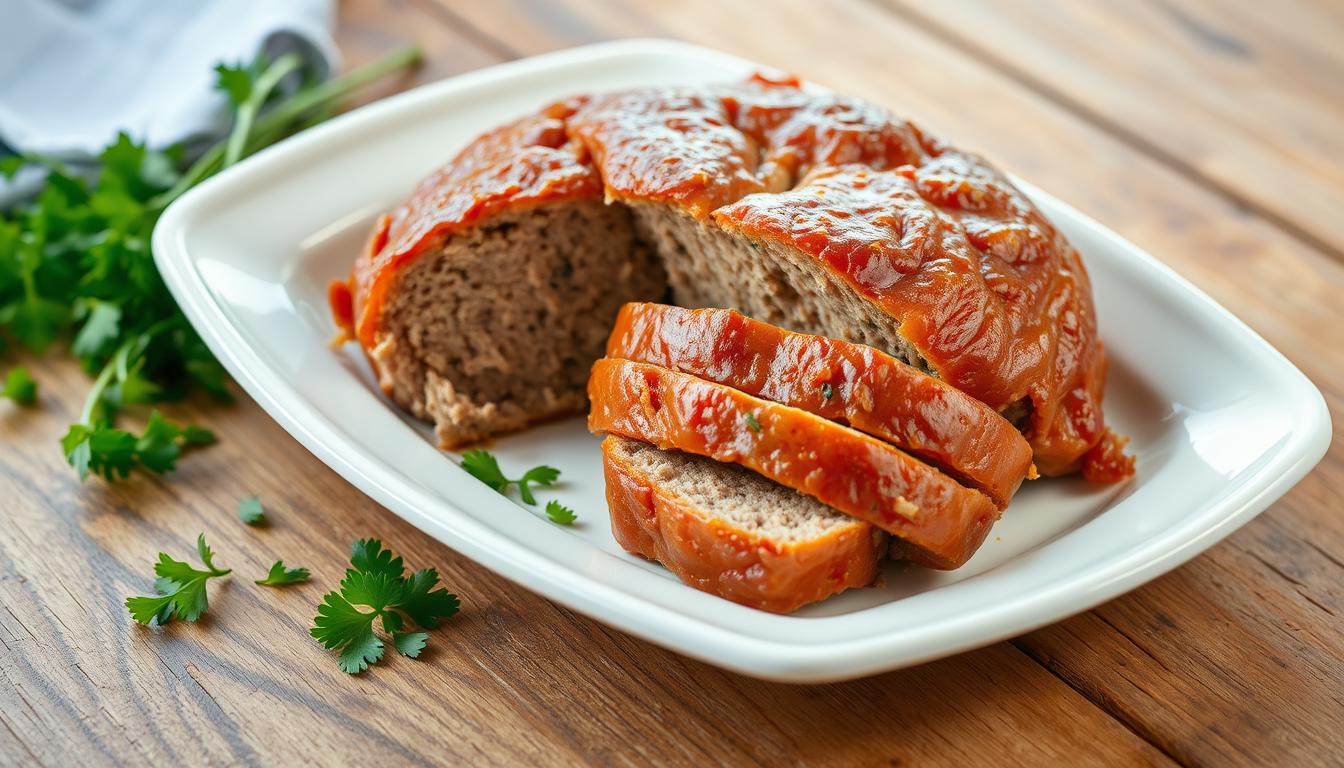Growing up in my grandmother’s kitchen, I learned that the best great meatloaf recipe isn’t just about ingredients—it’s about creating memories. The aroma of a Yes, Virginia There is a Great Meatloaf would fill our home. It turned an ordinary dinner into a comforting feast that brought our family together.
Meatloaf isn’t just a meal; it’s a culinary tradition that speaks to the heart of American home cooking. Whether you’re a seasoned cook or a kitchen novice, this best meatloaf recipe will guide you. It will help you create a dish that’s both nostalgic and delicious.
Key Takeaways
- Meatloaf is a versatile and beloved American classic
- Perfect meatloaf requires the right meat and binding ingredients
- Cooking temperature and time are crucial for optimal results
- Homemade meatloaf can be more flavorful than store-bought options
- Proper preparation ensures a moist and delicious dish
Introduction to the Great Meatloaf
Meatloaf is a classic in American food, loved by many for generations. It’s a comforting dish that brings families together. For decades, it’s been a favorite in kitchens across the United States.

A Classic American Dish
The Virginia meatloaf is more than a meal; it’s a tradition in American food. It started as a way to make do with less, but it became a beloved comfort food.
- Developed during the Great Depression
- Adaptable to various meat combinations
- Affordable family meal option
“Meatloaf is the ultimate expression of home cooking – simple, hearty, and full of love.”
Why Meatloaf is a Family Favorite
Families love meatloaf for good reasons. It’s easy to make and tastes great. You can change the recipe to fit everyone’s taste, making it a versatile dish.
- Quick preparation time (around 10 minutes)
- Budget-friendly ingredients
- Nutritious meal with balanced macronutrients
- Easily reheatable leftovers
Meatloaf gives you 418.9 calories and 34.1g of protein per serving. It’s a nutritious meal that keeps families full and energized.
Essential Ingredients for Meatloaf
Making a tasty homemade meatloaf begins with picking the right ingredients. Your traditional meatloaf dinner relies on knowing the key parts that make it unforgettable.
Choosing the Right Meat
For the best meatloaf, choose ground beef with the right fat level. Experts suggest using a mix of:
- 1 lb of 85% lean ground beef
- 1 lb of 93% lean ground beef
This blend offers the best taste and juiciness for your meatloaf dinner. It keeps the meat moist without being too greasy.
The Importance of Bindings
Bindings are key to a tender homemade meatloaf. Here are the essential binding ingredients:
- 2 large eggs (lightly beaten)
- ¾ cup quick oats
- ¾ cup milk (2% recommended)

“A good meatloaf is all about balance and the right binding ingredients.” – Culinary Experts
Flavor Enhancers to Consider
Add these flavor-boosting ingredients to your traditional meatloaf:
- 1 small onion (finely diced)
- 1 tablespoon Worcestershire sauce
- 2 teaspoons kosher salt
- ¼ teaspoon garlic powder
- ¼ teaspoon onion powder
- Dash of ground black pepper
These ingredients turn a simple meatloaf into a memorable dinner your family will love. Try different amounts to find your favorite flavor mix.
Preparing the Meatloaf Mixture
Making a great meatloaf recipe needs careful mixing and seasoning. The way you mix ingredients is key. Let’s look at the important steps for a tasty meatloaf.
Mixing Techniques for Uniformity
When making your best meatloaf, mixing right is essential. Here are some tips for a perfect mix:
- Use clean hands or a fork to gently combine ingredients
- Mix just until ingredients are incorporated
- Avoid overworking the meat, which can make it tough
- Break up any large chunks of meat or breadcrumbs
“The secret to a tender meatloaf is gentle mixing and knowing when to stop.”
Adjusting Seasonings to Taste
Seasoning can turn a simple meatloaf into a special dish. Here are some tips for adding flavor:
- Start with basic seasonings like salt and pepper
- Add depth with Worcestershire sauce or garlic powder
- Taste a small cooked sample to check seasoning
- Adjust herbs and spices to your preference
Pro tip: For food safety, cook a small patty to taste-test seasonings before forming the entire meatloaf. This ensures your great meatloaf recipe is perfectly seasoned every time.
Shaping Your Meatloaf
Making the perfect Virginia meatloaf is more than just mixing ingredients. The way you shape it can change its texture, taste, and look.
- Loaf Pan Method
- Ensures uniform shape
- Helps retain moisture
- Creates consistent cooking
- Free-Form Method
- Allows more surface area for crispy edges
- Provides better caramelization
- Creates rustic presentation
Perfecting Your Meatloaf Shape
For a great homemade meatloaf, follow these tips:
- Avoid overworking the meat mixture
- Gently form a compact loaf
- Maintain even thickness (about 2 inches)
- Create slight peaks for better glaze coverage
Common Shaping Mistakes to Avoid
Prevent a dense, dry meatloaf by avoiding these mistakes:
- Compressing meat too tightly
- Making uneven thickness
- Neglecting proper binding ingredients
“The secret to a great meatloaf is in the gentle touch and even shaping.” – Culinary Expert
Remember, your Virginia meatloaf’s shape affects both its cooking and looks. Take your time and handle the mixture with care.
Baking vs. Cooking in a Slow Cooker
Choosing the right cooking method is key to a perfect meatloaf dinner. Whether you bake in the oven or slow cook, it makes a big difference. Your easy meatloaf recipe will turn out better with the right choice.
When making the best meatloaf, knowing the pros and cons of each method is important. Each way can change how your dish tastes, feels, and looks.
Oven-Baked Meatloaf Benefits
Oven-baking has many advantages for your meatloaf:
- Creates a delicious crispy exterior
- Allows direct heat for better browning
- Provides opportunity for caramelized glazes
- Faster cooking time compared to slow cooker
Slow Cooker Advantages
Slow cooking has its own benefits for an easy meatloaf recipe:
- Produces incredibly tender meat
- Requires minimal supervision
- Prevents moisture loss
- Perfect for busy home cooks
For the ultimate meatloaf experience, try both methods. See which one you like best.
“The secret to a great meatloaf is not just the ingredients, but the cooking method that brings out the best flavors.”
Meatloaf Toppings: The Finishing Touch
Creating a delicious meatloaf is more than just the meat. The right topping can make a big difference. It turns a simple dish into a standout meal that everyone wants more of. Your Virginia meatloaf will be a hit with the perfect glaze or topping.
Toppings are key to taking your meatloaf to the next level. They add moisture, flavor, and a beautiful shine. This makes your dish look as good as it tastes.
Classic Tomato Glaze
The tomato glaze is a timeless favorite. Here’s a simple recipe to make your meatloaf shine:
- 1/2 cup ketchup
- 2 tablespoons brown sugar
- 1 tablespoon vinegar
- Dash of Worcestershire sauce
“A great glaze can turn a simple meatloaf into a memorable meal.”
Creative Topping Ideas
Ready to elevate your meatloaf? Try these unique topping ideas:
- BBQ Bourbon Glaze – Mix BBQ sauce with a splash of bourbon
- Maple Mustard Topping – Combine Dijon mustard and maple syrup
- Bacon Jam Spread – For an indulgent twist
- Caramelized Onion Topping – Sweet and savory option
Pro tip: Put your topping on during the last 15-20 minutes of baking. This prevents burning and lets the flavors caramelize.
Cooking Time and Temperature Tips
To make the best meatloaf, you need to get the cooking time and temperature right. Your homemade meatloaf should be juicy and perfectly cooked every time.
Ensuring Proper Doneness
Cooking a traditional meatloaf needs careful watching. Here are the key temperature tips:
- Preheat your oven to 350°F
- Bake for about 60 minutes
- Use a meat thermometer to check the internal temperature
- Make sure the meatloaf reaches 160°F at its center
“The key to a perfect meatloaf is hitting that precise internal temperature,” says culinary experts.
Resting Time Before Serving
After taking your homemade meatloaf out of the oven, be patient. Let it rest for 10 minutes before slicing. This resting time helps:
- Juices spread evenly through the meat
- Easier, cleaner slicing
- More consistent texture
- Enhanced overall flavor
Pro tip: Cover the meatloaf loosely with aluminum foil during resting. This keeps it warm and lets excess moisture escape.
Sides That Complement Meatloaf
Creating the perfect meatloaf dinner is more than just the main dish. The right side dishes can make a classic meatloaf unforgettable. They turn a simple meal into a complete dining experience that everyone will love.
Traditional Pairing Suggestions
Classic meatloaf is often paired with comfort food sides. These sides add warmth and familiarity to your meal. Here are some traditional options:
- Creamy mashed potatoes
- Steamed green beans
- Sweet corn kernels
- Buttered dinner rolls
Creative Side Dish Ideas
Try new side dishes to add excitement to your meatloaf dinner. These options offer nutritional balance and unique flavors:
- Roasted seasonal vegetables
- Quinoa salad with fresh herbs
- Crisp mixed green salad
- Cauliflower rice
“The right side dish can turn a good meal into an unforgettable dining experience.”
When picking sides, aim for a mix of textures and flavors. Lighter, vegetable-based sides can balance the richness of meatloaf. This creates a meal that’s both satisfying and healthy.
Meatloaf Variations to Try
Trying out different meatloaf recipes can make your easy meatloaf recipe stand out. You can find healthier options or ones that fit special diets. There are tasty alternatives to the usual beef meatloaf.
Turkey and Chicken Meatloaf Options
Lean poultry is great for a meatloaf. Ground turkey or chicken is lighter than beef but still feels like comfort food. Here’s how to make a Virginia meatloaf with poultry:
- Use ground turkey with 93% lean meat for best results
- Add extra moisture through ingredients like grated zucchini or applesauce
- Incorporate herbs to enhance flavor profile
- Ensure internal temperature reaches 165°F for safe consumption
Vegetarian Meatloaf Alternatives
Plant-based eaters can enjoy a tasty meatloaf-like dish. You can use:
- Lentils as a protein-rich base
- Mushrooms for meaty texture
- Beans for additional protein
- Plant-based meat substitutes
“Creativity in the kitchen means no one misses out on classic comfort foods!”
Try different ingredients to find your favorite meatloaf. It should match your diet and taste.
Storing and Reheating Leftover Meatloaf
Your homemade meatloaf can last longer than one night. By storing and reheating it right, you can enjoy it for days. This way, your meatloaf stays fresh and tasty.
Best Practices for Refrigeration
Keeping your meatloaf fresh is key. Here’s how to store it safely and keep its flavor:
- Cool the meatloaf completely before storing
- Use an airtight container for refrigeration
- Store in the refrigerator for up to 3-4 days
- Keep the container sealed to prevent moisture loss
“The key to great leftovers is proper storage and handling.” – Home Cooking Wisdom
Reheating Techniques to Preserve Flavor
Reheating meatloaf needs care. You want to keep it moist and its texture just right. Here are some good ways to reheat:
- Oven method: Preheat to 350°F, cover with foil to retain moisture
- Skillet technique: Warm slices on medium heat with a touch of broth
- Microwave option: Use medium power and cover to prevent drying
Pro tip: Always check the meatloaf’s internal temperature reaches 165°F. This ensures it’s safe to eat. With these tips, you can enjoy your meatloaf for days.
Frequently Asked Questions About Meatloaf
Creating the best meatloaf recipe can be tough for home cooks. Whether you’re making an easy meatloaf or a classic one, you’ll likely have questions.
Common Meatloaf Challenges and Solutions
Perfecting the meatloaf can face several hurdles. Here are common problems and how to fix them:
- Dry Meatloaf: Add moisture by mixing in breadcrumbs soaked in milk or using meat with a bit more fat
- Crumbly Texture: Use eggs to bind and avoid mixing the meat too much
- Bland Flavor: Try adding Worcestershire sauce, garlic, and herbs to boost the taste
Essential Tips for First-Time Meatloaf Makers
For your first classic meatloaf, remember these tips:
- Use a meat thermometer to check the meat reaches 160°F
- Let the meatloaf rest for 10-15 minutes after cooking to keep it moist
- Choose ground beef with 80% lean meat for the best flavor and texture
“The secret to a great meatloaf is in the details and love you put into preparation.” – Culinary Wisdom
With practice and patience, you’ll soon make a delicious meatloaf that your family will love!
Conclusion: Enjoying Your Great Meatloaf
Your delicious meatloaf journey has reached its final destination. Yes, Virginia, there is a great meatloaf waiting to become a cherished family tradition. The magic of this classic dish lies not just in its flavor, but in the memories you’ll create while preparing and sharing it with loved ones.
Making It a Family Tradition
A Virginia meatloaf recipe can transform an ordinary meal into a special event. Consider making this dish a regular part of your family’s weekly menu. Invite family members to participate in preparation, turning cooking into a bonding experience that spans generations. Each time you prepare the meatloaf, you’ll add another layer to your family’s culinary story.
Sharing Your Meatloaf Journey
Your meatloaf adventures don’t have to end in the kitchen. Share your recipes, techniques, and personal twists with friends and online cooking communities. Document your favorite variations, snap photos of your creations, and inspire others to explore the wonderful world of meatloaf cooking. Your unique approach might just become someone else’s new favorite recipe.

